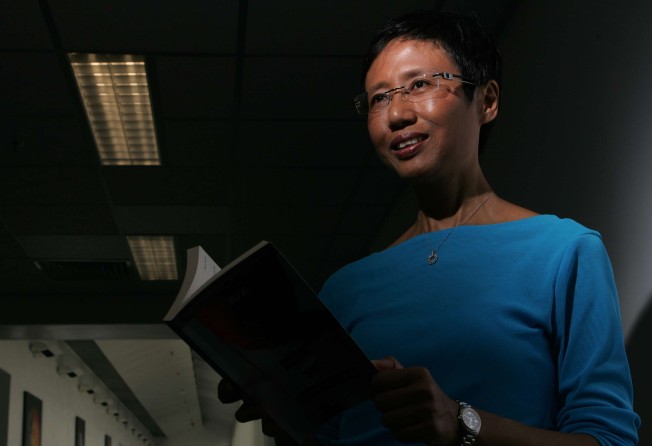
by Xu Xi
C&R Press
An American Sinophile goes missing en route to Hong Kong, a simple plot device that Xu Xi uses as a catalyst for her metafictional reflections on the self in the age of globalisation. There are jokes too


The man in the title of the upcoming book by Hong Kong author Xu Xi, That Man in Our Lives, is Gordon Ashberry. But who is he? And where is he? And in what sense is he, or isn’t he, the protagonist of That Man in Our Lives? And is he or isn’t he somebody in whom the reader can wholeheartedly believe?
Questions such as these tease the reader of That Man in Our Lives. Gordon Ashberry, also known as Gordie, also known by his Chinese name Hui Guo, is a wealthy American Sinophile and unmarried womaniser who has never needed to work. When he turns 50, Gordie decides to give all his money away. A predatory Chinese authoress, Zhang Lianhe, also known as Minnie Chang, also known as Lullabelle, makes him the subject of a book published in America as Honey Money.
This is a success, and the resulting publicity sends him into self-imposed exile. He disappears from Tokyo airport, en route from New York to Hong Kong. Naturally, this leaves everybody in his immediate circle bemused, upset, and keen to track him down. The novel is particularly concerned with the reactions of his two closest friends, Harold Haight, and Larry Woo, and their families.
The blurb describes That Man in Our Lives as “The Transnational 21st Century Novel”. It’s certainly transnational. The action ranges between the US and Asia, with quick diversions to Europe. Xu Xi calls three New York women “upwardly global”, a brilliantly funny description that could apply to most of her characters. She is much concerned with the effects of globalisation: on individual lives; on nations, and diasporas; on languages.
Xu Xi’s ethnically Chinese characters in America frequently comment on whether they mix their English with Cantonese, or Putonghua/Mandarin, and whether they call it “Putonghua” or “Mandarin”, or whether they use Taiwanese terms, or a mixture of some or all of these. In this English-language novel, Chinese words are scattered throughout, some transliterated into roman script, and some left in Chinese characters. The author’s interest in the use of Chinese language beyond China is of a piece with her interest in Chinese identities in a globalised world.

Like Zhang Lianhe/Minnie Chang/Lullabelle, Larry Woo, a naturalised American academic in the field of cultural studies, is also writing a book about Gordie, and, by extension, about Sino-American relations. He comes up with a novel distinction: “Sino-Chinese relations, that’s what he’d rather write about. If you’re from the Mainland, Beijing, or even Shanghai these days, you’re Sino, the fact of Chinese-ness being a given. All the rest, Hong Kong, Taiwan, American- and other hyphenations, or, as his two daughters are so fond of saying in unison, Daaaaadddd, wha da? are merely Chinese.”
Indeed, personal identity is something Xu Xi explores in many ways and at many levels. How does naming influence identity? Whatever the answer to that, characters with multiple names abound; particularly appealing is Suet-fa, a Hong Kong Chinese woman dating Gordie’s American godson, Pete Haight, who first changes her name to Tiara, and then to Tempest. And a missing protagonist whose history is slowly being revealed by a host of other characters immediately raises all sort of questions about how, for each of us, our identity is constructed, and deconstructed in the eyes of others, and hence also in our own eyes. Or vice versa.
The nature of the self and the shifting nature of personal identity is not the only postmodern theme or motif running through this book. As well as Honey Money, and Larry Woo’s book on Gordie, Pete is also moved to write about his godfather – his rather ill-advised online musing was the original spark for Minnie Chang’s book. Indeed, That Man in Our Lives is itself a metafiction, much concerned with texts and their production.
There is no 19th- and 20th-century pretence that the characters in the novel are not inventions – with the possible exception of X-woman, an ethnically Chinese female author now resident in New York, of whom, one imagines, the reader is bound to ask: is this Xu Xi?
Xu Xi’s presumed avatar X-woman is pulling the strings of this novel – and she is as much in search of Gordie as any of her (or Xu Xi’s?) characters. Throughout she offers comments on the authorial process, especially in a series of “interludes” in which she apparently meets some of her more minor characters.
That Man in Our Lives is an ambitious, witty and generous novel, which also has enough mystery to keep even somebody with 20th-century tastes turning the pages. It also delivers an Asian perspective on the challenges and opportunities of globalisation, while exploring the loss of traditional ideas about the self, and what that loss means for authors and readers.
Asian Review of Books